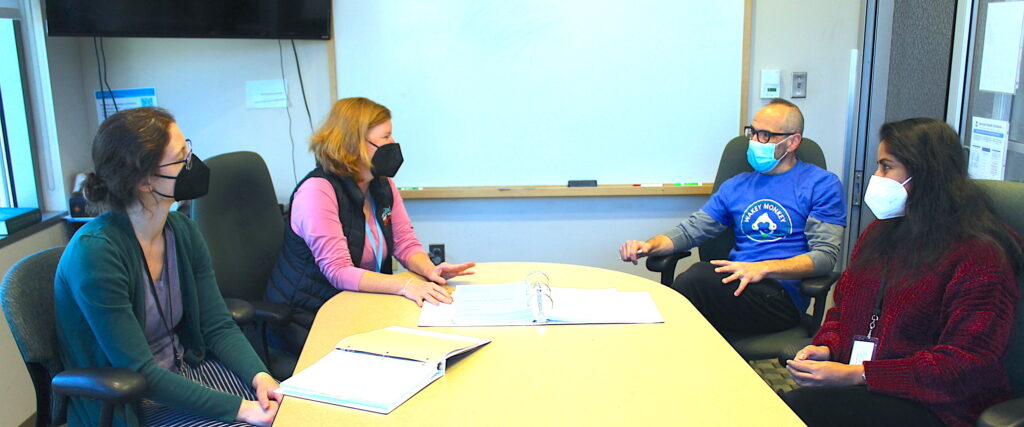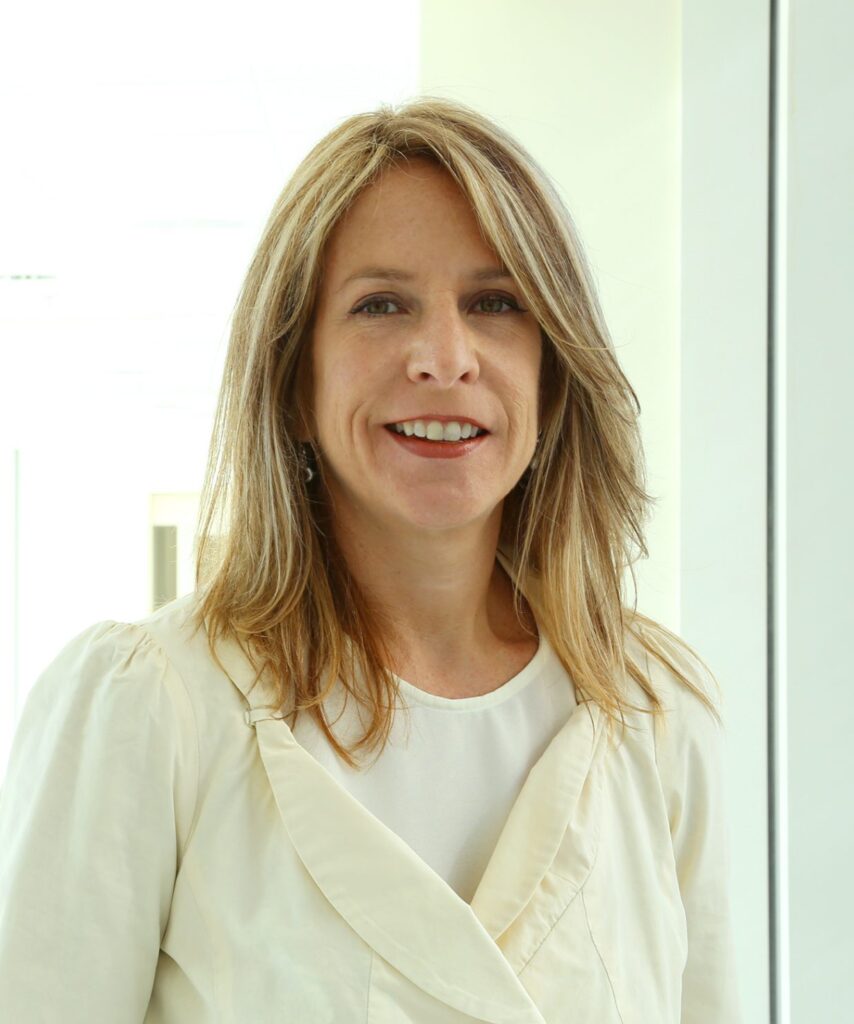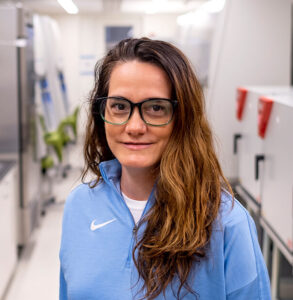
Infectious disease research at the UNC Institute for Global Health and Infectious Diseases (IGHID) attracts unique people driven to make big change in the world. As HIV/AIDS turned 40 in 2021, the world was immersed in a different pandemic, one that brought reminders of the tremendous change science made possible in understanding, treating and preventing HIV. Susan Pedersen, program manager for the Global HIV Prevention and Treatment Clinical Trials Unit, says the emergence of COVID was like a rebirth of that spirit as empowered researchers raced to find a solution.
“We had a pressing problem that was life threatening, and it was certainly compacted, compared to HIV, but it brought forth the same feelings and emotions of having the power to bring about change for the better.”

After nearly two pandemic years focused on COVID, CTU researchers are getting back to HIV studies. But for a while, IGHID’s built-in infrastructure for facilitating high quality research was called upon to help.
“We were a perfect opportunity for the NIH to implement COVID research because we had highly trained research professionals who were skilled and experienced in infectious diseases,” said Pedersen of the CTU, and the clinical research sites (CRS) in Chapel Hill, Greensboro, Vietnam and Malawi.
It was also UNC’s reputation and standards for quality research that brought the Moderna study to IGHID and the Novavax trials, recently endorsed for emergency use authorization, now awaiting FDA approval. While other study sites were able to enroll very high numbers of people, IGHID brought diversity to these studies, directed by Cindy Gay, MD, MPH.
“Our value was being able to ensure a broad representation of people of color, and older people, more representative of the US population,” Pedersen said.

And for study participants, having the ability to be directly involved in the solution has been a positive experience says Chapel Hill’s Operations Manager Erin Hoffman.
“We have a participant who recently lost someone to long COVID but explained how she felt great joy in being able to contribute to the greater good. She said she felt like she should be paying UNC for allowing her to be part of the solution instead of UNC reimbursing her for her time to participate.”
Miriam Chicurel-Bayard BSN, RN, Chapel Hill’s Clinical Research Staff Manager, says the same is true for HIV trials.
“Many of the early volunteers in HIV research are still volunteering for trials these days. They’ve been able to be part of the solution, and they feel really strongly about research.”
The Global HIV Prevention and Treatment Clinical Trials Unit is led by Joe Eron, MD, Mina Hosseinipour, MD, and David Wohl, MD. Wohl is also the site leader for the Chapel Hill CRS.
Getting back to HIV studies

To increase choices for prevention treatment, the CTU continues to pursue safe and effective long-acting alternative agents for HIV pre-exposure prophylaxis (PrEP). The North Carolina and Vietnam sites participated in HPTN 083, enrolling high-risk MSM (men who have sex with men) This was the first study to compare the two-month injectable Cabotegravir with an oral treatment to prevent HIV. The Malawi site participated in the landmark HPTN 084 study, co-chaired by Mina Hosseinipour, MD, which focused on high-risk women. Both studies contributed to the FDA’s approval of long-acting Cabotegravir (Cabenuva) in Dec. 2021.
In cure research, finding ways to target and destroy reservoirs is a major challenge facing researchers who are exploring different strategies for clearing out reservoirs. A latent HIV reservoir is a group of immune system cells in the body that are infected with HIV but not actively producing new HIV. The ACTG (AIDS Clinical Trials Group), has an aim to examine how HIV reservoirs can be cleared.
David Margolis, MD, who directs the UNC HIV Cure Center has been focusing on finding a cure for HIV/AIDS for many years, will soon lead a new effort with the ACTG, to build more recruitment and access a bigger population.
Facilitators of high-quality clinical research
CTU researchers thrive on addressing the challenging questions that need answers, that impact the lives of people everywhere.
“Our work attracts people who are really high performers, people who want to do excellent research. We pride ourselves on the quality of our research process and being recognized as a leader in the research process, one that other groups want to emulate,” Pedersen said.
It’s also because of people who have the vision to facilitate, to provide sites what they need to do good research.

Amy James Loftis, medical laboratory supervisor, who established and operated UNC’s COVID Surveillance Lab, drew on her experience setting up clinical trials and training around the world. She recently received the prestigious Massey Award, with Susan Fiscus and Amir Barzin, MD, for establishing the Carolina Testing Program in 11 weeks. Pedersen describes her as the CTU’s secret weapon, with unmatched laboratory implementation experience.
“The questions we ask have a laboratory-based answer and Amy is a super important part of a lot of the HIV research we do because our lab processes need to meet really high-quality standards. Amy is the person who ensures this happens across all sites. Tania does the same for regulatory.”
As director of regulatory affairs, Tania Hossain answers the questions researchers don’t know they need to ask, advising on ethical issues and serving as a liaison with the UNC’s Institutional Review Board (IRB), study sponsors and other regulatory bodies worldwide.
COVID also made a number of emerging needs urgent. Due to safety protocol, it was no longer possible to sit in a room with a participant for an hour to go through a study and have them sign a consent. Catherine Kronk, quality and data manager, has been instrumental in establishing ways to collect data electronically and teamed with Mike Owino, the CTU IT Director to create an electronic consent capability.
Vietnam CRS

In Vietnam, enrollment for a Hepatitis B vaccine study (A5379), for people who have been previously vaccinated but have suppressed immune systems, will soon be starting. Once only a site for a single prevention study, the Vietnam CRS has performed so well it is now a full-fledged site. Pedersen says it took nearly two years to prepare for this moment.
“Vietnam is a pivotal site with an untapped population of potential participants. We’re excited that it is now participating in research through the ACTG Network.”
Vivian Go, PhD, Gillings School of Public Health (GSPH) Professor of Health Behavior, is Vietnam’s Clinical Research Site Leader. Tran Viet Ha, MD, MSc, GSPH, assistant professor of health behavior, is the CRS Coordinator. Teerada Sripaipan, MPH, serves as a US-based project manager.
Greensboro CRS

Greensboro is also enrolling for the Hepatitis B study (A5379), along with another study that looks at people who have barriers to successful HIV treatment, to identify ways to provide extra support and easier treatment options (A5359).
“Greensboro is in the process of moving to a new facility with expanded research space, and doing a fantastic job in this post-COVID world of returning to HIV research.”
Kees Van Dam, MD, is Greensboro’s Site Director, Kim Epperson, RN, BSN, is the lead clinical research coordinator, and Kelly Phillips is the site administrator.
Malawi CRS

In addition to participating in HPTN 084 and ACTG studies, Malawi works with HVTN (HIV Vaccine Trials Network) and the IMPAACT (International Maternal Pediatric Adolescent AIDS Clinical Trials) Networks. Malawi implemented COVID vaccine research in the CoVPN (3008) and was a study specific site for HVTN 705. Malawi is also starting a new TB study (ACTG 5362).
“Malawi has an amazing breadth of studies and networks, participating in almost everything across the IGHID portfolio.”
Mina Hosseinipour, MD, MPH, professor of medicine and scientific director of UNC Project Malawi, is a CTU Principal Investigator based in Malawi. Lameck Chinula, MD, assistant professor of obstetrics and gynecology, is the site leader. Thokozani Makuhunga, MPH, serves as the CRS Coordinator.
About the Global HIV Prevention and Treatment Clinical Trials Unit
Administered through the UNC Institute for Global Health & Infectious Diseases, the Global HIV Prevention and Treatment Clinical Trials Unit brings together a diverse team of scientists working with some of the world’s most severely affected populations in Chapel Hill, Greensboro, Vietnam and Malawi. Its reputation and standards for research excellence, combined with a built-in infrastructure for facilitating high quality research, continues to bring leading trials to UNC through NIAID feeder networks, including the ACTG (AIDS Clinical Trials Group), of which Joe Eron, MD, is the vice chair (co-PI), the HVTN (HIV Vaccine Trials Network), CoVPN (COVID-19 Prevention Network), HPTN (HIV Prevention Trials Network), of which Myron Cohen, MD, is co-PI, and the IMPAACT (International Maternal Pediatric Adolescent AIDS Clinical Trials) Network. Learn more.
